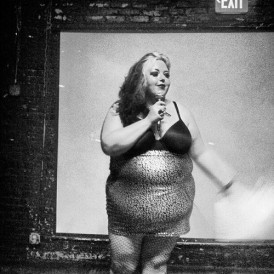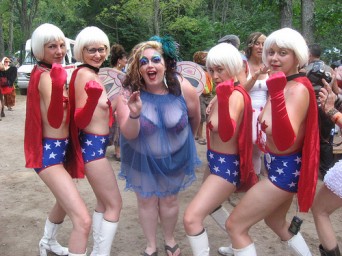
Photo via QueerFatFemme.com
BY BEVIN BRANLANDINGHAM
QueerFatFemme
In my interview with Amy McDonald at the Happy Healthy Lesbian Telesummit, she asked me for five tips people can employ to love their body more right now. I wanted to write these up and share them with readers who didn’t get a chance to hear the interview and for new readers who want to remember them from the interview. (If you missed the interview and want to listen to it–along with several other incredible talks with lesbian and queer folks talking about money, love, bodies, nutrition, travel, it’s available as a download. Click here to view more details.)
You don’t have to wait to have a good relationship with your body. Not after you lose weight or start going back to the gym or get a lover. Whatever space you’re in with it, you can start making peace right now.
1. Remember that you are not alone.
Everyone has a hard time with their body at some point or another. My friend Glenn Marla says, “There’s no wrong way to have a body.” And everyone can do better at loving their bodies right where they are at.
We’re in a society that commodifies insecurity–it serves the billion dollar beauty and diet industries if we hate ourselves so we buy all of their stuff. If you could really solve your own body hatred by buying something it would totally work but it doesn’t.
Even the most ardent body positive activist has “bad fat days,” and the struggle with our very human bodies is part of being human.
2. Be honest about your yucky feelings.
I am a big believer in naming our hard feelings and getting them out of ourselves. It helps expell shame. So if you feel complicated about a body part, be honest about it.
An exercise I’m a big fan of for a body part you feel complicated about is to talk to it. First, touch it, softly. If this were my stomach I’d rest my hands on it. Then I would talk to it. “Hey stomach, I’m feeling really complicated about you. X, Y and Z are making me feel really hard today.” Then, after you name the hard feelings, start thanking it for what it does do for you. “I know I feel complicated about you today, but I want to tell you thank you for being a soft place for my dog to rest, filling out my dresses, being a great canvass for a tattoo, etc…”

From a Rebel Cupcake a couple of years ago. I felt sooooo complicated about that outfit.
3. Take excellent care of yourself.
When you don’t feel good about your body it is really hard to have the motivation to take care of it. Self care is really important for mental, physical, emotional and spiritual help, though, and it becomes a self-fulfilling cycle, negatively and positively. The more you don’t take care of your body the more you start hating it and the reverse is true, too.
Once you start taking care of your body by doing things like getting enough sleep or learning intuitive eating, it starts helping you feel more comfortable in your body.
It’s taken me years to learn how to take care of myself and I’m still learning. I just said to Jacqueline the other day, “I’m 35 years old and I just realized that I absolutely need to eat lunch within a couple hours of breakfast. As soon as I leave the house I end up in this spiraling vortex of not being able to get the food I need and I get hangry and want to kill someone.” It is so weird because my logic brain is just like, “I shouldn’t be hungry yet,” except that I actually usually get hungry and should just pay attention to my body.
Is there something for your body you could do to take good care of it today? Like an extra hour of sleep? A long bath or shower? Self care stretches time, according to Kelli Jean Drinkwater, and it really goes a long way.
4. Get value-neutral about your body.
I heard a spiritual thought leader say that the body was just a vessel for the soul. I have found that idea very helpful in coming to terms with my body changing when I don’t ask it to. It’s similar to the sentiment I expressed about How to be a Good Ally to Fat People Who Appear to Have Lost Weight. It’s just a body, in a different form.
Sometimes our bodies are doing things that frustrate us, as in a period of lessened mobility, or sometimes our bodies may feel absolutely great. Being really attached to one kind of outcome or another is a vicious cycle of not enough or worry about things changing. Weight naturally fluctuates a little bit, skin gets saggy when it gets older. It just changes, but it doesn’t have to change how much unconditional love you have for your body.

Everybody has a body! With the Miracle Whips.
Part of learning to be body positive for me was learning my body was not my worth. The acceptance of your body without judgment is really powerful. It takes baby steps but repeating mantras of, “It’s just my body.”
5. Stop negative talk about other people’s bodies.
I absolutely love the expression, “When you point your finger you have three pointing back at yourself.” I have had to do a lot of work to stop judging other people’s bodies. When I hear myself begin to judge I stop and I change it to noticing. It’s a subtle difference but it does actually work. “I’m noticing that that person has amazing boobs. I’m noticing that that other person is very thin.”
We are conditioned in our diet/scarcity/commodified insecurity culture to judge other people’s bodies but that is actually not our job. So if I work to stop buying into that in my own head, and externally with my friends and family, I’m doing the work to change the culture I see as so damaging. I believe that change begins with me and I want to do my work to make the world more loving of all bodies.
I also think that we are our own worst critics. Whenever someone spends the time to say something really hateful I wonder what they are saying to themselves, alone, when no one is around. People who are terrible critics of other bodies are saying nastier things to themselves.
And the good news is as you get more value-neutral, compassionate and understanding about other people’s bodies it really helps to become compassionate about yours.
Originally published on QueerFatFemme.com
Bevin Branlandingham is your femmecee at QueerFatFemme, where she chronicles the relentless pursuit of her joy






